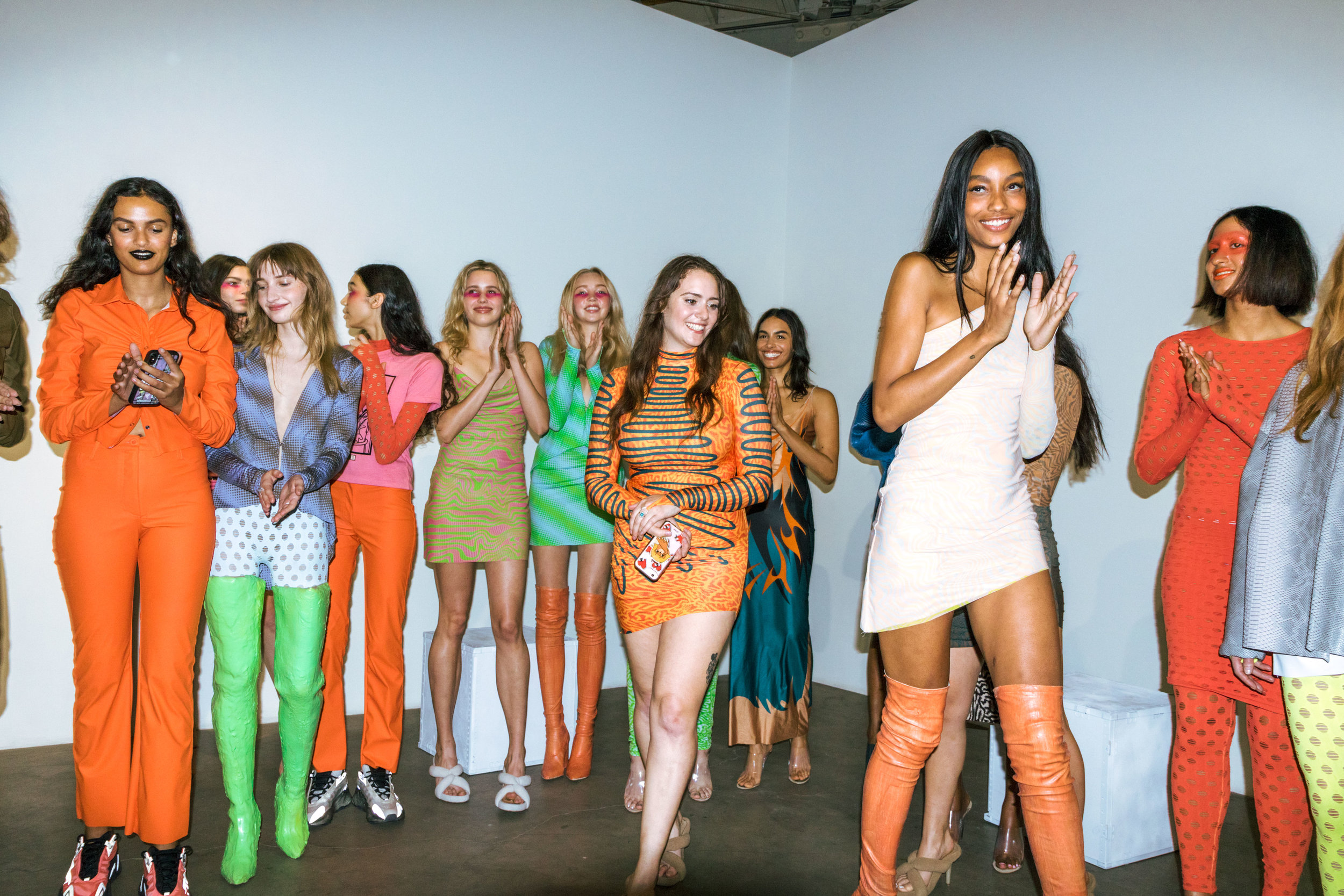Are celebrity mentors the new way to boost budding designers?
Are celebrity mentors the new way to boost budding designers?
Image credit: @devinkasparian instagram
Rapper, songwriter, designer, entrepreneur and now mentor. Earlier this week, Kanye West announced he would be setting up an incubator for emerging designers. Not only will he be providing guidance and resources but also vital financial assistance.
Although this is the first time the world has heard about West’s initiative, it appears to have been going on for a number of months. His first protégé is Yeezy womenswear designer Maisie Schloss. Her brand, Masie Wilen, is already set to debut an 85-piece collection to the industry with Los Angeles and Paris presentations scheduled for this month. (A quick look at Schloss’ LinkedIn shows she has worked for West’s Yeezy since December 2015. Her company, Yeezy-Schloss, has been active since October 2018.)
“Yeezy is a really special environment for growing and developing a career. When I started I was just an assistant, but the highly creative and unconventional atmosphere allowed for me to have visibility and input in a wide variety of projects,” Schloss recently told Vogue, adding: “Kanye very generously offered to support me; he truly cares about sharing resources, creating opportunities for creatives to grow and be recognised.”
But the 41-year-old isn’t the only star using their business acumen to help up-and-coming talent. Rihanna, too, is allowing young creatives into the Fenty fold. As well as hiring more established names from the likes of Louis Vuitton and Celine for her new luxury house, Rihanna also enlisted the help of Conner Ives. A Central Saint Martins graduate, he is famously known for designing model Adwoa Aboah’s 2017 Met Gala gown. Two days later, Rihanna herself stepped out in Ives’ Scarface T-shirt dress. It’s true that Rihanna isn’t handing over money to fund Ives’ own label. However, the connection alone may be enough to build his reputation.
So is getting under a celebrity’s wing the new key to fashion design success? Arguably, the hardest parts of being an emerging talent are finances and making yourself known to both the industry and consumers. A big name backer like West or Rihanna can certainly help with both.
Let’s start with the former. Unlike the tech world, investors are not knocking on the doors of fashion designers who are yet to make a profit. According to CFDA CEO Steven Kolb, this only happens when a brand becomes a “10, 15, 20, 25 million dollar business,” reports Fashionista. New designers therefore have to find the money to pay for materials, machinery, assistants, shows, PR, their own salary… The list goes on. Of course, certain initiatives such as the British Fashion Council’s NewGen exist to help with the financial side. But only a few names are selected each year.
Then there’s the much-needed exposure. Having a large and lively Instagram presence used to work. But as Loewe and JW Anderson creative director Jonathan Anderson told the Evening Standard, social media has been overrun by brands with money. “There was this moment where social media was great for young brands because the big brands weren’t using it. Now big brands can invest in it and, like magazines, buy market share,” he said. “So it becomes harder for the smaller brands to exist in that system.”
Those who don’t come from a wealthy background have only one other accessible option: develop personal relationships. And what better friend than a multi-millionaire with a loyal following, major influence and industry savviness? The support of a celebrity offers myriad benefits. They can expose a designer’s work to millions of people across the globe, provide enough financial assistance to allow creativity to soar, and, for those with fashion experience, can teach vital business lessons.
Rihanna and West are two unsurprising figures to start off this “trend”. Both have catapulted a diverse cluster of unknown names to design stardom simply by wearing their clothes. More importantly, both have never subscribed to a traditional way of thinking; something that can easily stunt a young designer’s growth.
Rihanna’s new luxury house, Fenty, is swapping expensive shows and stores for streetwear-esque online drops. With a $600 million net worth, Forbes recently named the 31-year-old the world’s richest female musician. Not for her musical talents, I might add, but for her Fenty Beauty achievements. (The cosmetics company generated $570 million of revenue in 2018.) Most people would agree with the following: anything with Rihanna’s backing almost guarantees financial success.
The precise value of West’s incubator financial backing is unknown, but even his expertise is worth its weight in gold. As Hypebeast reports, Yeezy — a clothing and footwear line that West started with adidas in 2013 — is said to have received a $1.5 billion valuation last August. Yeezy’s sartorial half may never have received the critical response that its creator yearned for, but the footwear portion took West’s dream path. His sneakers went from highly-coveted limited release items to readily available pieces. Despite many doubts, West’s prediction — “Eventually, everybody who wants to get Yeezys will get Yeezys” — has finally come true.
Taking on a mentorship role is therefore a natural step for fashion-obsessed, business-minded celebrities. And tech-style incubators or good old-fashioned A-list support are viable guardians for any struggling creative. Just one word of caution for emerging designers: be careful who you associate your brand with. The last thing you want is a controversial statement slicing your customer base in half.
Written by Lauren Sharkey fashion features contributor at Fashion, Law & Business

